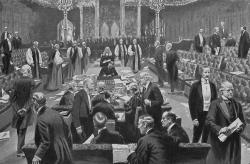LIPARM

LIPARM is a collaboration between King’s College London, the History of Parliament Trust, the IHR, the Centre for Data Digitisation and Analysis, Queen’s University Belfast, the UK Parliament Web and Intranet Service and the Northern Ireland Assembly. The main work of the IHR on this project will be the creation of authority records, as outlined below.
Parliamentary history in the United Kingdom stretches back eight centuries, and is being added to day by day as the parliaments and assemblies of England, Scotland, Wales and Northern Ireland meet, debate and legislate. The records of parliamentary proceedings, historical and contemporary, are almost all available in electronic form, but using these resources can be time consuming and cumbersome as every resource is different: in particular, each uses its own approach to metadata, which makes it impossible to browse or search the collections as a whole.
The LIPARM project will link the parliamentary record together for the first time by creating a unified metadata scheme for all of its key elements. People, bills, acts, items of business, debates, divisions and sessions will all be described by the scheme and will be linked together across resources which are currently spread out and isolated. For the first time, it will be possible to trace a given MP’s entire voting record or to find every speech they made. It will be possible to follow the passage of every bill or act, and every contribution to the debates that accompany it. Both the historical and the contemporary record of parliamentary proceedings will become accessible in this way for the first time.
The project will have three main strands. The first will devise the metadata schema itself, which will allow the contents of the parliamentary record to be described in a controlled and systematic way. The second will be the creation of authority lists for key components of the record, including lists for people, sessions, items of legislation and division: each component will receive a unique identifier, allowing it to be linked to from any digitised resource. The third component will be a pilot union catalogue, which will offer metadata records for two important collections, demonstrating how they can be linked together using the unified scheme.
JISC inspires UK colleges and universities in the innovative use of digital technologies,helping to maintain the UK’s position as a global leader in education.

